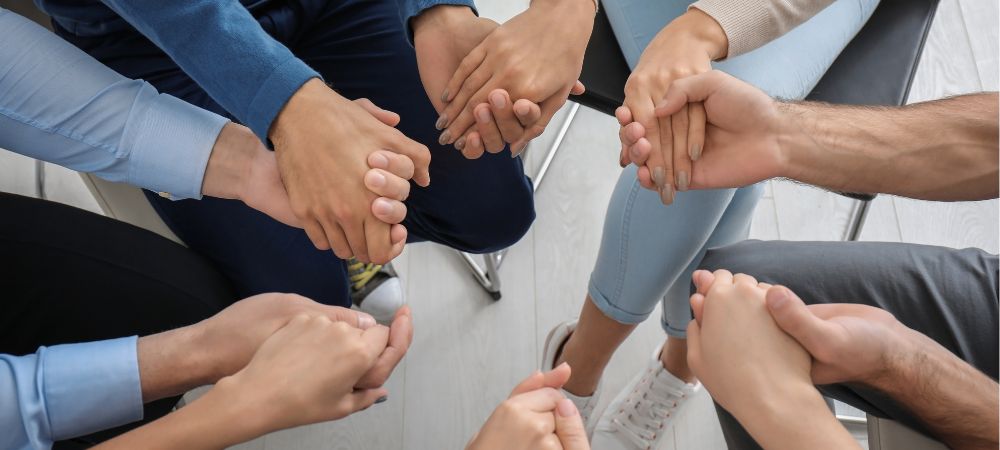According to the U.S. Department of Health and Human Services (HHS), 46.3 million people struggled with addiction in 2021.[1]
Addiction can affect everyone, no matter your class, race, gender identity, or religion. Because everyone can struggle with a substance use disorder, it’s important to have different types of programs to ensure that each person’s needs are met. Two of the most popular addiction treatment programs are known as intensive outpatient programs (IOPs) and outpatient programs (OPs).
IOP treatment centers offer intensive services on an outpatient basis to provide people with the support they need while still offering flexibility in scheduling. On the other hand, outpatient programs are a step down, offering less intensive services and more flexibility in scheduling.
What is Intensive Outpatient Programming (IOP)?
Intensive outpatient programs (IOPs) offer the same addiction treatment services as a partial hospitalization program (PHP). However, patients will meet at the facility multiple times per week for several hours at a time to receive treatment and then return to their own homes. Additionally, many people who attend IOP are residing in a sober living home for additional support and accountability.
The services provided during an IOP include:
- Individualized treatment planning
- One-on-one therapy
- Group counseling
- Family and couple’s therapy
- Addiction education groups
- Relapse prevention planning
- Drug and alcohol testing
- Aftercare services like alumni support groups
When you attend an IOP, the amount of days you commute for treatment will depend on your needs. Typically, people receive 20 to 30 hours of treatment per week during intensive outpatient programs. IOP may last anywhere between 30 to 90 days.
What is an Outpatient Treatment Program (OP)?
Outpatient treatment programs (OPs) are a step down from IOPs in terms of how intensive the treatment is. Many people choose to attend an IOP and transition into an OP after they complete their treatment program. However, some people with mild or moderate substance use disorders might benefit from using an outpatient program as a standalone treatment option.
Outpatient programs provide the following treatment services:
- Individualized treatment planning
- One-on-one therapy
- Group counseling
- Family therapy
- Addiction education groups
- Relapse prevention planning
- Drug and alcohol testing
OP treatment programs require you to spend less time receiving services than IOPs do. For example, it is common for people to attend treatment for less than 20 hours per week. This leaves plenty of time for an individual to get the support they need while continuing to work, go to school, or care for responsibilities at home.
The Main Differences Between IOP and OP
The main difference between IOPs and OPs is the intensity of treatment. While IOPs offer intensive treatment, OP uses a more laid-back approach to addiction recovery. As a result, OP is only intended for people who have already completed higher forms of treatment or only struggle with mild substance use disorders.
Additionally, IOPs and OPs differ in the amount of hours you spend receiving services. While IOP is more demanding, OPs provide enough flexibility to allow you to continue working outside of treatment.
Outpatient programs offer less intensive treatment on a less frequent basis, so people should not attend these programs unless they are ready to keep themselves accountable for their own recovery. While they still offer randomized drug testing, you will have more free time on your hands. If you are not dedicated to staying sober yet, only attending an OP could set you up for a relapse.
Deciding Which Program is Right for You
If you struggle with a severe substance use disorder or have a co-occurring mental health condition, your needs are better suited for an intensive outpatient program that can provide you with all of the support and services you need to recover. Additionally, if you have relapsed in the past, it is best to partake in IOP before transitioning into OP.
However, if you relate to the following, you might be ready for outpatient treatment:
- You have a mild substance use disorder or have already completed a more intensive program
- You are dedicated to staying sober and can keep yourself accountable
- You live in a safe and supportive household
- You need to continue working or going to school while attending treatment sessions
- You are living in a sober living home where you receive extra support outside of treatment
Oftentimes, an outpatient program is best used as part of a continuum of care. This means you would attend other forms of treatment like inpatient or an IOP before transitioning into an OP. However, some people find outpatient programs to be enough to help them get back on track after dealing with a relapse or a mild addiction.
Learn More About Your Outpatient Rehab Options in New Jersey
If you or a loved one struggles with addiction, it’s time to seek professional help. At the Living Room at Princeton, our comprehensive outpatient treatment services are designed to meet your needs and can help you regain control over your life.
At The Living Room, we offer a comprehensive range of evidence-based programs to support individuals on their journey to recovery from substance use disorders. Our programs are tailored to address the unique needs of adults and adolescents, ensuring that each individual receives the personalized care they deserve. Whether you’re seeking intensive support or a more flexible approach, our diverse program offerings have you covered.
To learn more about our outpatient drug and alcohol rehab programs in New Jersey, please contact us today.
References:
- The U.S. Department of Health and Human Services (HHS): SAMHSA Announces National Survey on Drug Use and Health (NSDUH) Results Detailing Mental Illness and Substance Use Levels in 2021, Retrieved November 2023 From https://www.hhs.gov/about/news/2023/01/04/samhsa-announces-national-survey-drug-use-health-results-detailing-mental-illness-substance-use-levels-2021.html


